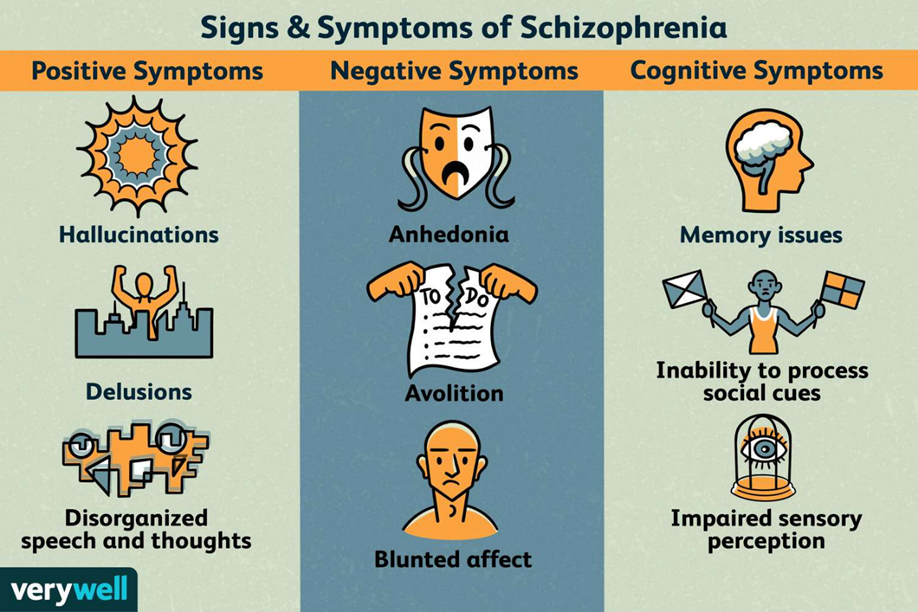A nurse is providing discharge teaching about the manifestations of relapse to the family of a client who has schizophrenia. Which of the following information should the nurse include in the teaching?
The client begins sleeping more than usual.
The client develops an inability to concentrate.
The client exhibits an inflated sense of self.
The client increases participation in social activities.
The Correct Answer is A
Choice A reason:
Excessive sleep or a significant change in sleep patterns can be an indicator of a relapse in schizophrenia. Schizophrenia can disrupt the regular sleep-wake cycle, leading to either insomnia or hypersomnia (excessive sleep). When a client with schizophrenia begins sleeping more than usual, it may suggest a worsening of symptoms or an impending relapse. It's essential for the nurse to include this information in the discharge teaching so that the family can monitor and seek help if the client's sleep patterns change significantly.
Choice B reason:
An inability to concentrate is another potential sign of a relapse in schizophrenia. Cognitive difficulties, including problems with concentration, are common in schizophrenia and can worsen during a relapse. This symptom can affect the client's ability to function daily and adhere to treatment plans. Therefore, it is crucial for the nurse to educate the family about this sign so they can recognize it early and consult with healthcare providers.
Choice C reason:
Exhibiting an inflated sense of self is not typically associated with schizophrenia relapse. While some individuals with schizophrenia might experience grandiose delusions, an inflated sense of self is not a common or specific sign of relapse. The family should be aware of more characteristic symptoms such as changes in sleep, concentration, mood, or behavior.
Choice D reason:
Increasing participation in social activities is generally not a sign of relapse in schizophrenia; in fact, it is often encouraged as part of the recovery process. Social withdrawal, rather than increased participation, would be more concerning and could indicate a relapse. It's important for families to support the client's social engagement as it can be beneficial for their overall well-being.

Nursing Test Bank
Naxlex Comprehensive Predictor Exams
Related Questions
Correct Answer is ["A","B","E","F"]
Explanation
Choice A:
GHB (gamma-hydroxybutyric acid) is known to cause nausea and vomiting, especially at higher doses. These symptoms are common side effects of GHB ingestion and can be distressing for the patient.
Choice B:
Confusion is a significant complication associated with GHB use. GHB acts as a central nervous system depressant, leading to altered mental status and confusion. This can impair the patient’s ability to communicate effectively and understand their surroundings.
Choice C:
Tachycardia, or an abnormally fast heart rate, is not typically associated with GHB use. GHB tends to cause bradycardia (slowed heart rate) rather than tachycardia. Therefore, this option is not a correct answer.
Choice D:
Hypothermia, or abnormally low body temperature, is not a common complication of GHB use. GHB does not typically affect body temperature regulation in a way that would lead to hypothermia. Thus, this option is not a correct answer.
Choice E:
Amnesia is a well-documented effect of GHB, often referred to as the “date rape drug” due to its ability to cause memory loss1. This can result in the patient having no recollection of events that occurred while under the influence of the drug.
Choice F:
Respiratory depression is a severe and potentially life-threatening complication of GHB use. GHB can depress the central nervous system to the point where breathing becomes slow and shallow, which can lead to respiratory failure5. This is a critical concern in managing patients who have ingested GHB.
Correct Answer is ["C","D","E","F","I"]
Explanation
Choice A: Impaired cognition can occur during alcohol withdrawal but is not typically an immediate concern requiring urgent intervention. It is more of a general symptom that can be monitored over time.
Choice B: Insomnia is a common symptom of alcohol withdrawal but does not usually require immediate follow-up. It can be managed with supportive care and medications if necessary.
Choice C: Seizures are a severe and potentially life-threatening complication of alcohol withdrawal. They require immediate medical attention to prevent further complications and ensure the client’s safety.
Choice D: Increased blood pressure is a sign of autonomic hyperactivity during alcohol withdrawal. It can indicate severe withdrawal and requires immediate follow-up to prevent complications such as hypertensive crises.
Choice E: An increased heart rate is another sign of autonomic hyperactivity and can indicate severe withdrawal. Immediate follow-up is necessary to manage the client’s cardiovascular status and prevent complications.
Choice F: Diaphoresis (excessive sweating) is a common symptom of severe alcohol withdrawal and indicates autonomic hyperactivity. It requires immediate follow-up to manage the client’s condition.
Choice G: Lack of appetite is a common symptom of alcohol withdrawal but does not typically require immediate follow-up. It can be managed with supportive care and nutritional support1.
Choice H: Vomiting can lead to dehydration and electrolyte imbalances, which are serious concerns during alcohol withdrawal. Immediate follow-up is necessary to manage these risks3.
Choice I: Tremulousness (tremors) is a common and early sign of alcohol withdrawal. It indicates autonomic hyperactivity and requires immediate follow-up to prevent progression to more severe symptoms.
Choice J: Malaise is a general feeling of discomfort and is common during alcohol withdrawal. It does not typically require immediate follow-up but should be monitored as part of the overall care plan.
Whether you are a student looking to ace your exams or a practicing nurse seeking to enhance your expertise , our nursing education contents will empower you with the confidence and competence to make a difference in the lives of patients and become a respected leader in the healthcare field.
Visit Naxlex, invest in your future and unlock endless possibilities with our unparalleled nursing education contents today
Report Wrong Answer on the Current Question
Do you disagree with the answer? If yes, what is your expected answer? Explain.
Kindly be descriptive with the issue you are facing.
